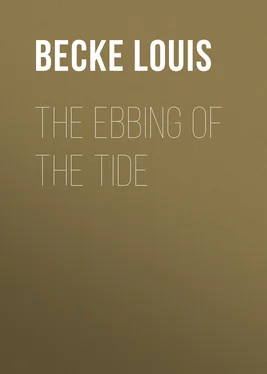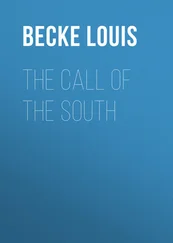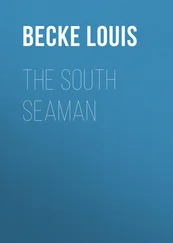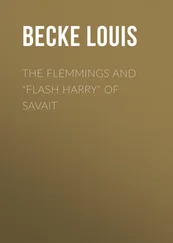Louis Becke - The Ebbing Of The Tide
Здесь есть возможность читать онлайн «Louis Becke - The Ebbing Of The Tide» — ознакомительный отрывок электронной книги совершенно бесплатно, а после прочтения отрывка купить полную версию. В некоторых случаях можно слушать аудио, скачать через торрент в формате fb2 и присутствует краткое содержание. Жанр: foreign_prose, literature_19, foreign_antique, на английском языке. Описание произведения, (предисловие) а так же отзывы посетителей доступны на портале библиотеки ЛибКат.
- Название:The Ebbing Of The Tide
- Автор:
- Жанр:
- Год:неизвестен
- ISBN:нет данных
- Рейтинг книги:5 / 5. Голосов: 1
-
Избранное:Добавить в избранное
- Отзывы:
-
Ваша оценка:
- 100
- 1
- 2
- 3
- 4
- 5
The Ebbing Of The Tide: краткое содержание, описание и аннотация
Предлагаем к чтению аннотацию, описание, краткое содержание или предисловие (зависит от того, что написал сам автор книги «The Ebbing Of The Tide»). Если вы не нашли необходимую информацию о книге — напишите в комментариях, мы постараемся отыскать её.
The Ebbing Of The Tide — читать онлайн ознакомительный отрывок
Ниже представлен текст книги, разбитый по страницам. Система сохранения места последней прочитанной страницы, позволяет с удобством читать онлайн бесплатно книгу «The Ebbing Of The Tide», без необходимости каждый раз заново искать на чём Вы остановились. Поставьте закладку, и сможете в любой момент перейти на страницу, на которой закончили чтение.
Интервал:
Закладка:
The old priest nodded to Brice—“Native blood, native blood, M. Brice. Do not, I pray you, misjudge her. She only does this because she knows the village feeling against her. She does not belong to this island, and the people here resented, in a quiet way, her marriage with my old friend. She is not cruel and ungrateful as you think. It is but her way of showing these natives that she cares not to benefit by Baldwin’s death. By and by we will send for her.”
After Baldwin had been buried and matters arranged, Brice and the priest, and a colleague from the Mission, read the will, and Brice found himself in possession of some two or three thousand dollars in cash and as much in trade. The house at Rikitea and a thousand dollars were for Loisé.
He told the Fathers to send word over to Vehaga and tell Loisé that he only awaited her to come and take the house over from him. As for himself he would gladly accept their kind invitation to remain at the Mission as their guest till the schooner returned.
The shock of his friend’s death had all but cured him of his passion, and he felt sure now of his own strength.
But day after day, and then week after week passed, and no word came from Vehaga, till one evening as he leant over the railing of the garden, looking out upon the gorgeous setting of the sun into the ocean, Maturei came paddling across the smooth waters of the harbour, and, drawing his canoe up on the beach, the boy approached the white man.
“See,” he said, “Loisé hath sent thee this.”
He unrolled a packet of broad, dried palm leaves, and taking from it a thick necklet of sweet-smelling kurahini buds, placed it in Brice’s hand.
He knew its meaning—it was the gift of a woman to an accepted lover.
The perfume of the flowers brought back her face to him in a moment. There was a brief struggle in his mind; and then home, friends, his future prospects in the great outside world, went to the wall, and the half-blood had won.
Slowly he raised the token and placed it over his head and round his neck.
In the morning she came. He held out his hand and drew her to him, and looking down into her eyes, he kissed her. Her lips quivered a little, and then the long lashes fell, and he felt her tremble.
“Loisé,” he said simply, “will you be my wife?”
She glanced up at him, fearfully.
“Would you marry me?”
His face crimsoned—“Yes, of course. You were his wife. I can’t forget that. And, besides, you said once that you loved me.”
They were very happy for five or six years down there in Rikitea. They had one child born to them—a girl with a face as beautiful as her mother’s.
Then a strange and deadly epidemic, unknown to the people of Rikitea, swept through the Paumotu Group, from Pitcairn Island to Marutea, and in every village, on every palm-clad atoll, death stalked, and the brown people sickened and shivered under their mat coverings, and died. And from island to island, borne on the very breath of the trade-wind, the terror passed, and left behind it empty, silent clusters of houses, nestling under the cocoanuts; and many a whale-ship beating back to the coast of South America, sailed close in to the shore and waited for the canoes to come off with fruit and vegetables; but none came, for the canoes had long months before blistered and cracked and rotted under the fierce rays of the Paumotu sun, and the owners lay dead in their thatched houses; for how could the dead bury the dead?
It came to Rikitea, and Harry Brice and the priests of the Mission went from village to village trying by such means as lay in their power to allay the deadly scourge. Brice had seen his little girl die, and then Loisé was smitten, and in a few days Brice saw the imprint of death stamped upon her features.
As he sat and watched by her at night, and listened to the wild, delirious words of the fierce fever that held her in its cruel grasp, he heard her say that which chilled his very heart’s blood. At first he thought it to be but the strange imaginings of her weak and fevered brain. But as the night wore on he was undeceived.
Just as daylight began to shoot its streaks of red and gold through the plumed palm-tops, she awoke from a fitful and tortured slumber, and opened her eyes to gaze upon the haggard features of her husband.
“Loisé,” he said, with a choking voice, “tell me, for God’s sake, the truth about Baldwin. Did you kill him? ”
She put her thin, wasted hands over her dark, burning eyes, and Brice saw the tears run down and wet the pillow.
Then she answered—
“Yes, I killed him; for I loved you, and that night I went mad!”
“Don’t go away from me, Harry,” she said, with hard, panting breaths; “don’t let me die by myself.... I will soon be dead now; come closer to me, I will tell you all.”
He knelt beside her and listened. She told him all in a few words. As Baldwin lay in his drunken sleep, she and Maturei had pierced him to the heart with one of the long, slender, steel needles used by the natives in mat-making. There was no blood to be seen in the morning, Maturei was too cunning for that.
Brice staggered to his feet and tried to curse her. The last grey pallor had deepened on her lips, and they moved and murmured, “It was because I loved you, Harry.”
The sun was over the tops of the cocoanuts when the gate opened, and the white-haired old priest came in and laid his hand gently on Brice who sat with bowed figure and hidden face.
“How is your wife now, my good friend?” he asked.
Slowly the trader raised his face, and his voice sounded like a sob.
“Dead; thank God!”
With softened tread the old man passed through to the inner room, and taking the cold hands of Brice’s wife tenderly within his own, he clasped them together and placed the emblem of Christ upon the quiet bosom.
AT A KAFA-DRINKING
I
The first cool breaths of the land breeze, chilled by its passage through the dew-laden forest, touched our cheeks softly that night as we sat on the traders’ verandah, facing the white, shimmering beach, smoking and watching the native children at play, and listening for the first deep boom of the wooden logo or bell that would send them racing homewards to their parents and evening prayer.
“There it is,” said our host, who sat in the farthest corner, with his long legs resting by the heels on the white railing; “and now you’ll see them scatter.”
The loud cries and shrill laughter came to a sudden stop as the boom of the logo reached the players, and then a clear boyish voice reached us—“ Ua ta le logo ” (the bell has sounded). Like smoke before the gale the lithe, half-naked figures fled silently in twos and threes between the cocoanuts, and the beach lay deserted.
One by one the lights gleamed brightly through the trees as the women piled the fires in each house with broken cocoanut shells. There was but the faintest breath of wind, and through the open sides of most of the houses not enough to flicker the steady light, as the head of the family seated himself (or herself) close to the fire, and, hymn-book in hand, led off the singing. Quite near us was a more pretentious-looking structure than the others, and looking down upon it we saw that the gravelled floor was covered with fine, clean mats, and arranged all round the sides of the house were a number of camphorwood boxes, always—in a Samoan house—the outward and visible sign of a well-to-do man. There was no fire lighted here; placed in the centre of the one room there stood a lamp with a gorgeous-looking shade, of many colours. This was the chief’s house, and the chief of Aleipata was one of the strong men of Samoa—both politically and physically. Two of our party on the verandah were strangers to Samoa, and they drew their chairs nearer, and gazed with interest at the chief and his immediate following as they proceeded with their simple service. There were quite a number of the aua-luma (unmarried women) of the village present in the chief’s house that evening, and as their tuneful voices blend in an evening hymn—
Читать дальшеИнтервал:
Закладка:
Похожие книги на «The Ebbing Of The Tide»
Представляем Вашему вниманию похожие книги на «The Ebbing Of The Tide» списком для выбора. Мы отобрали схожую по названию и смыслу литературу в надежде предоставить читателям больше вариантов отыскать новые, интересные, ещё непрочитанные произведения.
Обсуждение, отзывы о книге «The Ebbing Of The Tide» и просто собственные мнения читателей. Оставьте ваши комментарии, напишите, что Вы думаете о произведении, его смысле или главных героях. Укажите что конкретно понравилось, а что нет, и почему Вы так считаете.












